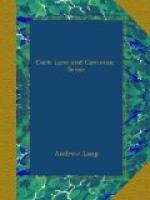It is not without hesitation that this book is offered to the reader. Very many people, for very various reasons, would taboo the subjects here discoursed of altogether. These subjects are a certain set of ancient beliefs, for example the belief in clairvoyance, in ‘hauntings,’ in events transcending ordinary natural laws. The peculiarity of these beliefs is, that they have survived the wreck of faith in such elements of witchcraft as metamorphosis, and power to cause tempest or drought. To study such themes is ‘impious,’ or ‘superstitious,’ or ‘useless’. Yet to a pathologist, or anthropologist, the survivals of beliefs must always be curious and attractive illustrations of human nature.
Ages, empires, civilisations pass, and leave some members even of educated mankind still, in certain points, on the level of the savage who propitiates with gifts, or addresses with prayers, the spirits of the dead.
An example of this endurance, this secular survival of belief, may be more instructive and is certainly more entertaining than a world of assertions. In his Etudes Egyptiennes (Tome i. fascic. 2) M. Maspero publishes the text and translation of a papyrus fragment. This papyrus was discovered still attached to a statuette in wood, representing ‘the singer of Ammen, Kena,’ in ceremonial dress. The document is a letter written by an ancient Egyptian scribe, ’To the Instructed Khou of the Dame Onkhari,’ his own dead wife, the Khou, or Khu, being the spirit of that lady. The scribe has been ‘haunted’ since her decease, his home has been disturbed, he asks Onkhari what he has done to deserve such treatment: ’What wrong have I been guilty of that I should be in this state of trouble? what have I done that thou should’st help to assail me? no crime has been wrought against thee. From the hour of my marriage till this day, what have I wrought against thee that I need conceal?’
He vows that, when they meet at the tribunal of Osiris, he will have right on his side.
This letter to the dead is deposited in the tomb of the dead, and we may trust that the scribe was no longer annoyed by a Khou, which being instructed, should have known better. To take another ancient instance, in his Philopseudes Lucian introduces a kind of club of superstitious men, telling ghost stories. One of them assures his friend that the spectre of his late wife has visited and vexed him, because he had accidentally neglected to burn one of a pair of gilt shoes, to which she was attached. She indicated the place where the shoe was lying hidden, and she was pacified. Lucian, of course, treats this narrative in a spirit of unfeeling mirth, but, if such tales were not current in his time, there would have been no point in his banter. Thus the belief in the haunting of a husband by the spirit of his wife, the belief which drives a native Australian servant from the station where his gin is buried, survived old Egypt, and descended to Greece. We now take a modern instance, closely corresponding to that of the Instructed Khou of the Dame Onkhari.




